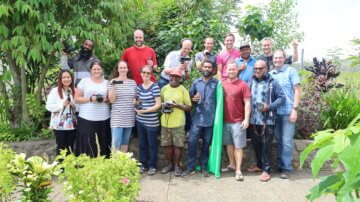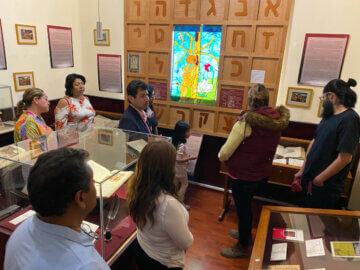Partners in Ministry: English Language Classes
From August to October 2021, two members of Wycliffe Singapore developed online English Language classes for some of our Indonesian ministry partners. We met with William, the coordinator, to find out more about teaching English as a second language.
1. Tell us more about these classes; how did they start?
The Indonesian English Class ministry started with a request from our Indonesian partners. It came at a time when my spouse Michelle and I were in the middle of a TESOL (Teaching English to Speakers of Other Languages) certification course. We had returned to Singapore after many years in other countries and took this course to retool for further deployment. God’s perfect timing!
Our Indonesian coordinator informed us that 42 students were interested in this English class. This meant that we had to recruit teachers to conduct the classes. We crafted a flyer and received a very good response. Out of the 30+ responses, 10 teachers were selected. Two were members of Wycliffe Singapore, six were from various churches in Singapore and one was from Malaysia.
With the help of the Indonesian coordinator, students participated in a placement test and submitted an audio recording of themselves answering five questions to determine their English level. Using this information, we divided the group into three levels and five classes - two beginner classes, two intermediate classes and one advanced class.
We bought an online curriculum for the teachers to use as a resource in their preparation of the lessons.
We began the class year in August 2021 and the last lesson was held on 28 October 2021; a total of 22 hourly lessons for the five classes, meeting twice a week.
2. What has been most challenging about teaching English as a second language?
The placement test gave us an indication of the students’ English level but it was not very precise. Early on, the teachers had difficulty adjusting the lesson to the students’ level. After the first two weeks, as the teachers and the students got to know one another, I could tell that learning was beginning to take flight.
Another challenge was that some of the students lived in remote locations where the internet was not very stable, and they often had to reconnect during the classes.
3. What is your greatest takeaway from this programme?
Our aim for this class was to help build English language capacity so our Indonesian partners could be more effective in their Bible translation roles.
Seeing the students come in lesson after lesson and along with their enthusiasm and improvement through the weeks is probably the greatest reward the teachers could ask for.
We saw the students grow in confidence using the language both inside and outside of the Zoom classroom, for example in using social media. They are no longer just students and teachers; no longer just partners in the Bible translation movement; but they are brothers and sisters in Christ. We rejoiced together with students who got married during this period and with those who graduated from their formal and informal education programmes, We also mourned together with those who suffered illness and had family members who passed away. We became family and look forward to the day we can meet face-to-face.
4. Words of advice for volunteer teachers?
Due to some of the students’ unreliable internet bandwidth, minimising the use of technology (other than the Zoom meeting room itself) makes classes easier for the students. For students with English as their second language, less teaching, more practice and more speaking opportunities are very important and useful for them.
The latest
View all articles
03/2024 Pacific: Papua New Guinea
Informing, teaching, inspiring: PNG workshop teaches video storytelling for language communities
PNG workshop teaches video storytelling for language communities
Read more
02/2024 Global
Looking ahead at 2024
As the year unfolds, we marvel at the work of God in our rapidly changing world. And, we look forward to a number of gatherings and conversations intended to draw us together.
Read more
01/2024 Americas
Telling the Bible's Story
It may come as a surprise that a museum is among the Wycliffe Global Alliance organisations.
Read more